“My Hope is Built,’ “Rock of Ages,” “This Little Light”: Hymns for Laity Sunday
WHAT WILL WE SING THIS LAITY SUNDAY?
Come to a church that’s refreshing, inspiring, and fun!
At PUMC we play beautiful classical and sacred music during worship, and that refreshes the spirit. We also sing well-known and new hymns as well as “gospel songs” that lift us to Heaven. We pray that our music will inspire everyone, old and young and help them find faith and hope.
The hymns that will be sung this Sunday describe personal feelings of pain and suffering, and the hope, which we get from God’s presence especially in church.
“My Hope is Built on Nothing Less” was written by Edward Mote, a pastor at  Rehoboth Baptist Church in Horsham, West Sussex as a Christian hymn. The refrain of the hymn refers to the Parable of the Wise and the Foolish Builders and the metaphor of Christ as a rock according to 1 Corinthians 10:4 [Wikipedia]. This hymn tells us to trust in God when we face the unknown, for Christ will give us support and hope. It also tells about Christ’s triumphant second coming, as recorded in (Matthew 24:43, Acts 1:9-11, 1 Corinthians 11:26, 1 Thessalonians 5:2-4, 2 Peter 3:10, and Revelation 16:15).To watch a YouTube video of this hymn, click here.
Rehoboth Baptist Church in Horsham, West Sussex as a Christian hymn. The refrain of the hymn refers to the Parable of the Wise and the Foolish Builders and the metaphor of Christ as a rock according to 1 Corinthians 10:4 [Wikipedia]. This hymn tells us to trust in God when we face the unknown, for Christ will give us support and hope. It also tells about Christ’s triumphant second coming, as recorded in (Matthew 24:43, Acts 1:9-11, 1 Corinthians 11:26, 1 Thessalonians 5:2-4, 2 Peter 3:10, and Revelation 16:15).To watch a YouTube video of this hymn, click here.
“Rock of Ages” is a Christian hymn sung to the tune “Toplady” by Thomas Hastings in the  US. It is believed that the Reverend Augustus Toplady was inspired to write it after seeking shelter from a thunderstorm in a cleft in a rock at Burrington Combe in Somerset, England in 1776. “In “Rock of Ages,” the singer confesses, and is comforted, that in life, death, and eternity his standing before God depends entirely on the merits of Christ—the only safe place, or rock, where lawbreakers can hide from the curse they have brought upon themselves.”To watch a YouTube video of this hymn, click here.
US. It is believed that the Reverend Augustus Toplady was inspired to write it after seeking shelter from a thunderstorm in a cleft in a rock at Burrington Combe in Somerset, England in 1776. “In “Rock of Ages,” the singer confesses, and is comforted, that in life, death, and eternity his standing before God depends entirely on the merits of Christ—the only safe place, or rock, where lawbreakers can hide from the curse they have brought upon themselves.”To watch a YouTube video of this hymn, click here.
“This Little Light of Mine” is a popular gospel song, its origin unknown, but sung all  around the world. It is often thought of as an African-American spiritual, but can be found in The United Methodist Hymnal and other hymn books. It was sung as a Civil Rights anthem in the 1950s and 1960s, especially the version by Bettie Mae Fikes. It became a popular children’s song and is also included in Christian children’s song books. In 2018, counter-protesters sang “This Little Light of Mine” defiantly before a crowd of white supremacists and alt-right supporters in Charlottesville.“This Little Light” is also sung in several scenes of the 1994 film Corrina, Corrina starring Whoopi Goldberg and Ray Liotta. A version of this popular song was played at the wedding of Prince Harry and Meghan Merkle in May 2018. To watch a YouTube video of this hymn, click here.
around the world. It is often thought of as an African-American spiritual, but can be found in The United Methodist Hymnal and other hymn books. It was sung as a Civil Rights anthem in the 1950s and 1960s, especially the version by Bettie Mae Fikes. It became a popular children’s song and is also included in Christian children’s song books. In 2018, counter-protesters sang “This Little Light of Mine” defiantly before a crowd of white supremacists and alt-right supporters in Charlottesville.“This Little Light” is also sung in several scenes of the 1994 film Corrina, Corrina starring Whoopi Goldberg and Ray Liotta. A version of this popular song was played at the wedding of Prince Harry and Meghan Merkle in May 2018. To watch a YouTube video of this hymn, click here.
Click here to listen to the PUMC worship service, hear the beautiful music, the children’s time, the scripture readings, the sermon, the prayers and the story sharing.
Images Source: google images
Written by Isabella Dougan
LONGEST NIGHT SERVICE – December 17, 2019
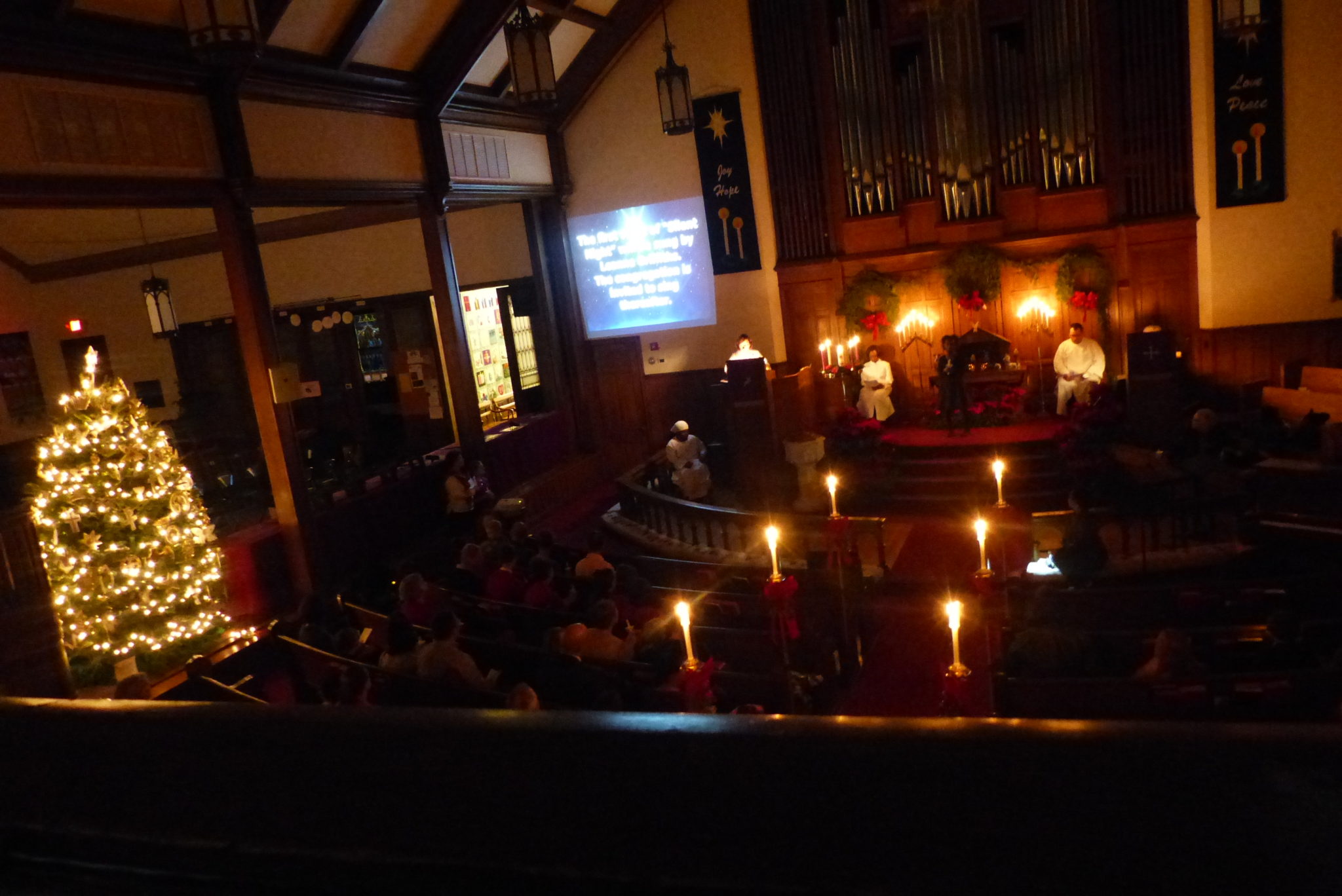
As a peaceful, healing solace for those who are hurting and mourning — away from the frenzy of the season – Rev. Jenny Smith Walz and PrincetonUMC’s Stephen Ministers will offer a “Longest Night Service,” on Tuesday, December 17 at 7:30 p.m.
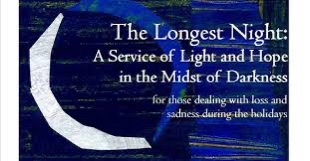
Sermon “The Bethlehem Trek: From Despair to Hope”
On December 9, 2018, the 2nd Sunday of Advent, Rev. Jenny Smith Walz preached a sermon titled “From Despair to Hope” from the series ‘The Bethlehem Trek’. Her text is from Malachi 3:1-4 and Luke 1:67-79.
To hear the sermon live, go to the Princeton United Methodist Church Facebook page
Also, the sermon will be podcast soon on this webpage under the category “worship”.


Luke 1:67-79
Then his father Zechariah was filled with the Holy Spirit and spoke this prophecy:
Blessed be the Lord God of Israel,
for he has looked favorably on his people and redeemed them.
He has raised up a mighty savior for us
in the house of his servant David,
as he spoke through the mouth of his holy prophets from of old,
that we would be saved from our enemies and from the hand of all who hate us.
Thus he has shown the mercy promised to our ancestors,
and has remembered his holy covenant,
the oath that he swore to our ancestor Abraham,
to grant us that we, being rescued from the hands of our enemies,
might serve him without fear, in holiness and righteousness
before him all our days.
And you, child, will be called the prophet of The Most High;
for you will go before the Lord to prepare his ways,
to give knowledge of salvation to his people
by the forgiveness of their sins.
By the tender mercy of our God,
the dawn from on high will break upon us,
to give light to those who sit in darkness and in the shadow of death,
to guide our feet into the way of peace.’
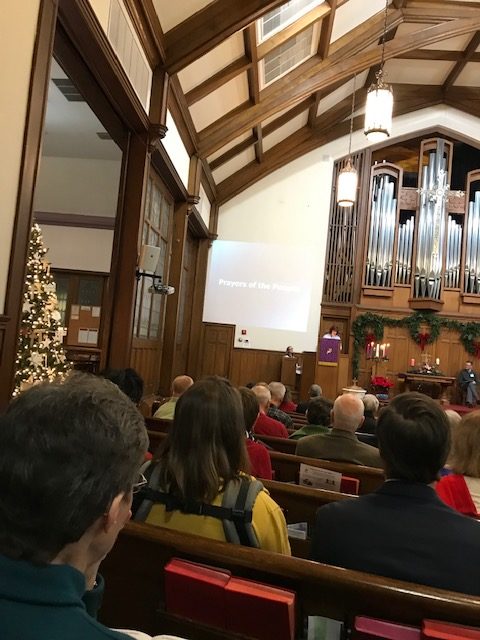
Are you sitting in darkness? Are you sitting in the shadow of death?
When does despair creep into your life? Maybe it’s a constant companion – especially if you suffer from depression. It’s there more often than not, no doubt. But most all of us have these moments where we just aren’t sure that the future will be positive, that there’s any way out of this mess, that good things can and will happen, that there is a future at all.
- After a loss of relationship or job
- death
- in any sort of storm in life
- after listening to the news
- politically things don’t go your way
Zechariah sat in some darkness for a while himself. In Zechariah’s case – there were some reasons to be less hopeful – his own childlessness, and ongoing occupation by Rome, to name two.
Do you remember Zechariah? A priest, whose turn it was to offer incense in the sanctuary. Older, childless – social, spiritual implications if no children.
When Gabriel comes – angel catches him in a moment of despair. Uncertain about the future, that there would be a positive outcome in the future, at least for him and Elizabeth. Angel Gabriel – you will have a son! name him John! You will have joy and gladness! He will be filled with HS! He will turn hearts to God, make people ready for this new thing God is doing.
“How will I know? – my wife and I are getting on in years. Yeah, I’ve heard this sort of things before – these prophecies about a savior. I’m afraid Can I trust? Hope? for Elizabeth and I? for my people? Struck mute.
The next time we hear from him is here. John has been born, and upon his birth, when others want to name him Zechariah after him, he writes, affirming his wife Elizabeth’s pronouncement, that his name was to be John. At that moment, he is able to speak again. And this song is his response. And it’s vastly different than when Gabriel meets him in his darkness. I wonder what happened to him in his silence. There are several things I think he did in that time.
Acted – he and Elizabeth acted as if the angel’s predictions were true. It’s an act of courage and strength to do hope-filled things. Jeremiah – bought a field as the nation was falling to the Babylonians.
Remembered – the ways God has acted and continues to act. God is trustworthy. God keeps God’s promises. This is part of why we worship, we read scripture, we study and pray with one another – to remember. God is the beginning and the end, the alpha, and omega. Christ was born, Christ has died, Christ is risen, Christ will come again. Abraham, Noah, Moses, prophets, God will do a new thing, God is doing a new thing.
Patience found – Patience is the assurance that it is worth it, it is worth the frustration, worth the setbacks. “We are Climbing Jacob’s Ladder” verse: “the struggle is long, but the hope is longer.” Suffragettes – took 70 years to secure the vote for women: song: “we shall not, we shall not be moved, just like a tree that’s planted by the water, we shall not be moved.” Wild patience. Anne Lamott – hope begins in the dark. It depends, not on sight, glimpses, and glimmers, but on waiting, watching, and working.
Community engaged – when we cannot, others will hope on our behalf (like belief, prayer.) We have each other, we are accompanied by these saints, and we carry candles to light at least a little of the way. We are the church.
Envisioned – in what ways are your Christian hopes too limited? If our life together as the people of PUMC was made into a wonderful movie with a happy ending, tell me what that last part of the movie would look like? Our world history? Or your life?
Zechariah was transformed in the silence. He was refined and purified in these months. He became hopeful, joyful!
Anne Lamott – Hope begins in the dark, it is not dependent on sight, glimpses, and glimmers, but on waiting, watching, and working.
The Absurdity of Advent: Forgiving Love



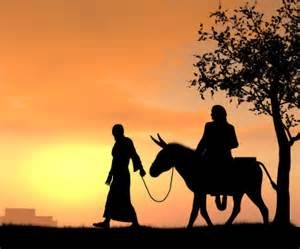
Rev. Jana Purkis-Brash – 4th Sunday in Advent: December 18. Luke 2:15-20; John 3:16
Today is the fourth Sunday of Advent, next week we will gather for worship to celebrate the birth of Jesus the newborn king.
These last four weeks we have spent in a season of expectation and hope. It is also a season of following — a time when we travel along with the Holy Family as they struggle with the hardships of peasant life in first-century Palestine. The Christmas story, as we have come to know it, includes much drama and tension, and we might even say absurdity.
The drama of Christmas begins in anxiety. An unplanned pregnancy is followed by an imperial summons to Bethlehem. Along the way there are mysterious angelic interventions, improvised accommodations for birth and royal orders of infanticide. Yet, in the midst of such challenging conditions,// newness and promise overflow. There is a father’s word of prophecy, a mother’s song of revolution, gift-toting wise men and praise-filled shepherds. Yes, the long hoped for Messiah will arrive — but not quite as we had expected, another point of absurdity.
When the Shepherds headed into town to see the Messiah I can imagine the whispering that might have taken place. “Did I hear correctly Eli, did the angel say, the sign is a baby that was born in Bethlehem?” Another shepherd says to the guy behind him, did that angel say, “to you is born this day in the city of David a Savior, who is the Messiah, the Lord?” A baby born// is the Messiah we have been waiting for, it’s absurd!!
Each year as we get ready to close Advent night, the highlight of the evening comes when kids and adults alike are all sugared up and we sing together “The Twelve Days of Christmas.” As we were singing this year I got to thinking,// I wonder how much it costs to purchase all those gifts? Have you ever wondered about that?// You may not be surprised, but I was, to find out that for more than 30 years PNC bank has calculated the prices of the 12 gifts from this song.
Take a guess at the total cost of purchasing all the gifts mentioned in the “12 Days of Christmas” song… This holiday extravaganza would cost $34,363 this year, an increase of just 0.7% from last year. The Consumer Price Index has risen about twice as fast, at 1.7% over the past 12 months.
The gift with the biggest price hike was the cost of two turtledoves ($375), which spiked 29 percent due to a shortage of the birds. Rising wages also drove up prices, with the cost of 11 pipers piping ($2,708) and 12 drummers drumming ($2,934) rising 2.8 percent this year. Granted, I don’t know where you would find them, but they are very expensive.
At $210, a partridge in a pear tree saw the biggest price decline this year. The cost of partridges fell to $20, thanks to an increase in supply. The cost of the pear tree ticked lower as well. While gold prices have gone up and down significantly over the past five years, the cost of five golden rings has held steady at $750.
All these extravagant gifts are for a true love. As a matter of fact the Hallmark Channel is showing a movie centered around these gifts to a beloved. Still, the real message of Christmas is not the gifts that we give to each other. Rather, it is a reminder of the gift that God has given to each of us. We are God’s true love, you are God’s true love.
This gift of love keeps on giving. This gift comes in the birth of a baby and the death of a man who gives his whole life to and for us. Jesus comes as forgiving love. “For God so loved the world that he gave his only Son, so that everyone who believes in him may not perish but may have eternal life.” In that gift of forgiving love also comes eternal life.
As we think about God’s gift of forgiving love, there are a few things I’d call to your attention: Continue reading “The Absurdity of Advent: Forgiving Love”
Sunday November 13 – Rev. Jana Purkis-Brash: Where Is Your Power? Isaiah 40:27-31, Ephesians 3:14-21
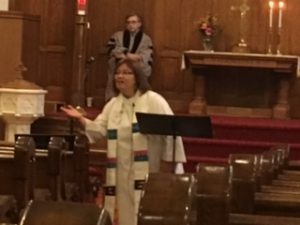 What a week this has been. I’ve spent a great deal of time listening to and caring for people. I have encouraged people to sit in and feel their despair, anger, sadness, hopelessness, fear, and uncertainty. We must allow ourselves to feel what we are feeling before moving ahead to action.
What a week this has been. I’ve spent a great deal of time listening to and caring for people. I have encouraged people to sit in and feel their despair, anger, sadness, hopelessness, fear, and uncertainty. We must allow ourselves to feel what we are feeling before moving ahead to action.
It has prompted me to think about times in my life when all seemed lost, and how I was able to claim God’s strength and power. As I think about difficult times in my life I think of a church burning down, a parsonage burning down, miscarriages, losing my mom over the course of 10 years to dementia, and in those same years my dad dying of cancer. My daughter eloping with a man she barely knew and moving halfway around the world. There were times in each of these personal situations that I didn’t see a way forward, I was hopeless and angry, fearful and despairing. One way that I was able to move forward was claiming God’s power and strength through scripture.
I grew up in the northeast when memorizing scripture was passé, thankfully as an adult I have learned scripture that sustains me. It was in the midst of a breast cancer scare a few years ago that I held tight to scripture and this week I’ve found myself doing same. (David/Ulanda has read two of those scriptures for us this morning)
For me these scriptures and some others strengthen me and help me to claim the power I need to move forward in faith and hope. Today I’m going to bring more scripture passages to play than usual; I hope you will hear the assurance these passages offer.
This morning I want to share with you a story that I hope will help us to think about where our power lies.
Once upon a time a man found the egg of an eagle. It had been abandoned for some reason by its mother, but as it was still warm the man took it and put it in the nest of one of his backyard chickens along with the other eggs that were there being brooded upon. After a period of time the eaglet was hatched, and along with the other chicks from his nest began to go about the backyard doing what the other chicks did. He scratched the earth for worms and insects. He looked for the corn that the man would throw into the yard. He clucked and cackled as best as he could, and as he grew, he would, like the other chickens, thrash his wings and fly a few feet in the air.
Years passed in this way and the eagle grew very old.  One day he saw a magnificent bird far above him in the cloudless sky. It glided majestically among the powerful wind currents, soaring and swooping, scarcely beating its long golden wings. The old eagle looked at it in awe and asked “what is that?” “That is the eagle, the king of the birds”, said one of his neighbors. “He belongs to the sky and to the high places. We belong to the earth, we are chickens.” The old eagle knew this was true, and so it was he lived and died as a chicken, for that is what he believed he was.
One day he saw a magnificent bird far above him in the cloudless sky. It glided majestically among the powerful wind currents, soaring and swooping, scarcely beating its long golden wings. The old eagle looked at it in awe and asked “what is that?” “That is the eagle, the king of the birds”, said one of his neighbors. “He belongs to the sky and to the high places. We belong to the earth, we are chickens.” The old eagle knew this was true, and so it was he lived and died as a chicken, for that is what he believed he was.
Do you think the eagle/chicken had the power to change? What held him back?
Think with me for a moment about the verses at the end of Ephesians chapter three: 20-21.”Now to him who by the power at work within us is able to accomplish abundantly far more than all we can ask or imagine; to him be glory in the church and in Christ Jesus to all generations, forever and ever.”
Do you have the power to change? What holds you back?
If you drew your power from God what could you accomplish that you aren’t doing now?
Can we believe in new possibilities for ourselves? Continue reading “Sunday November 13 – Rev. Jana Purkis-Brash: Where Is Your Power? Isaiah 40:27-31, Ephesians 3:14-21”
Sunday June 26. Resident Theologian Donald Brash “Tweeting the Message: Did we forget anything?”

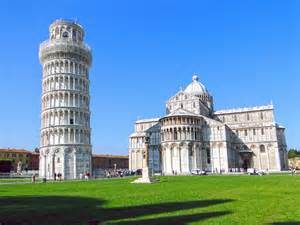


This morning we begin a new series of sermons on the one-liners we may read on people’s Twitter messages, or TWEETs. Twitter is one of the cyberspace ways that people stay connected. The question before us as we proceed weekly through this series is how do we stay connected to God, even with our more casual inclinations during the summer months
Today’s one line TWEET is, “Did we forget anything.”
Jana thought, thinks I am well suited to address this topic. We won’t repeat that conversation here. Envision with me a family one hour into a ten-hour drive to their vacation destination. One parent turns to the other and asks: Did we forget anything? My own answer to this question is realistic: I assume that I did… Experience has taught me that I will have forgotten something. So far, I am glad to say, that something has not been a some-one.
 You probably will not be surprised when I say that Jana is the queen of list makers, and advanced planners. She often brings on our trips what she thinks I might forget. So, when I need that item, and she hands it to me, I lower the volume of my complaining about the quantity and weight of her luggage. It’s an artful tactic that works for her… and – for us.
You probably will not be surprised when I say that Jana is the queen of list makers, and advanced planners. She often brings on our trips what she thinks I might forget. So, when I need that item, and she hands it to me, I lower the volume of my complaining about the quantity and weight of her luggage. It’s an artful tactic that works for her… and – for us.
In Joseph and Mary’s day, planning ahead for a trip was not merely an operational preference made by disciplined people, like Jana: It was a necessity. Nothing could be wasted, and forgetting to take something needed could be fatal. Ancient journeys required careful planning. It was best to travel in groups, because rogues and brigands haunted some regions, despite the Pax Romana. There likely would have been discussions about who would bring what, and in what order they would walk or ride, where they would stop for the night, and who would take the first and second and third watches.
Let’s start TWEETING our responses to this week’s question: Did we forget anything? Not as likely if we made a list and started preparing early.
We forget more than things, and not only on vacations. I refer first to those many, many times each DAY when perhaps I should speak for myself – when I give credence to the phrase, “absent-minded professor.” You may be able to relate to some of the following examples, in question form, even beyond the stereotype of walking into a room and forgetting why you entered it. Do you look at your cell phone and wonder why you took it from your pocket or purse? Do you sit and stare at the icons on the phone hoping to remember the one you should press? Do you drive down the highway and, at some surprising moment realize you do not remember driving from point a to point b? Do you ever get a phone call from the bank asking you to return the canister to the drive-thru. (That may be just me. It was an embarrassing moment.)
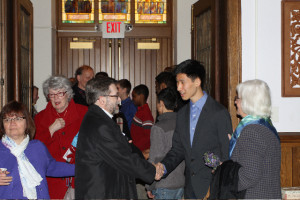 Ours is a forgetful generation, and it is not just because some of us spend too much time with our minds elsewhere. We are drawn toward lifestyles that are mentally fragmenting. Television and radio, cellphones, computers and so much more are over-stimulating; and so, overwhelmed, we disassociate from the present, and we forget. I suggest that (I am working on this one now) in order to reduce mental fragmentation and enhance our focus on the here and now we may benefit from pausing, just pausing: perhaps before beginning our day in earnest, or between tasks, or in the evening, or all of the above. We read in the gospels that Jesus often went into the wilderness to be alone. He knew that rhythm is essential to nature. It is written in the fabric of this world. That we will benefit from taking a few minutes regularly to reflect on where we were, where we are, and where we are heading probably is in our DNA.
Ours is a forgetful generation, and it is not just because some of us spend too much time with our minds elsewhere. We are drawn toward lifestyles that are mentally fragmenting. Television and radio, cellphones, computers and so much more are over-stimulating; and so, overwhelmed, we disassociate from the present, and we forget. I suggest that (I am working on this one now) in order to reduce mental fragmentation and enhance our focus on the here and now we may benefit from pausing, just pausing: perhaps before beginning our day in earnest, or between tasks, or in the evening, or all of the above. We read in the gospels that Jesus often went into the wilderness to be alone. He knew that rhythm is essential to nature. It is written in the fabric of this world. That we will benefit from taking a few minutes regularly to reflect on where we were, where we are, and where we are heading probably is in our DNA.
SECOND TWEET: Did we forget anything? Not as likely if we paused before we left. (SUBTWEET: Even less likely if we have included pausing in the rhythm of our days.)
Still beyond things and vacations alone: Forgetting has consequences both for individuals and communities. There are three journeys in our lesson from Luke’s Gospel, and they are interesting as they were motivated by community memory. I begin most days with a reading from the Christian Testament, the New Testament, if you prefer. I read it in Greek, which is the language of composition for most of its documents. I am not special in this: Many professors of theology are able to read an ancient language. When reading in Greek, I often discover something new to me, a detail I did not see before, one that both stimulates and focuses my thinking. Sometimes I relearn something I once knew. Have you noticed that life’s lessons are easily forgotten and must be relearned many times? Like individuals, a community with amnesia repeats the mistakes of the past. Just two generations from the holocaust, anti-semitism is on the rise again in Europe, along with anti-“otherism.” (Europe is a not-so-distant mirror.) Fascism is an expression of anarchy disguised as nationalist loyalty. Fear is the great enemy – the demonic force behind hatred and scapegoating.
ANOTHER TWEET: Did we forget anything? Not as likely if we are attentive to our lessons.
Forgetting is not always a problem. We need to be able to forget in order to make room for what our conscious minds can hold. On the other hand, some forgetting damages our ability to enjoy the present. Memories that are repressed sometimes contribute to our driven-ness, our sense of urgency and fragmentation, our diving in and swimming with very little if any sense of direction. Repetition compulsions (neurotic habits) are another subject for another day – I’ll not share any of mine today…
I WILL TWEET this much: Not as likely if we look for what we may have overlooked.
The first journey is about Jesus’ birth – a familiar story. Jesus’ father and mother traveled to Bethlehem. Upon their arrival, there was no place to stay, and Mary was giving birth. We may relate to their fear and anxiety. Some journeys include dramatic events: illness, hospitalization… we might substitute in Mary and Joseph’s case updated language. Instead of no room in the upper room, where guests were lodged, we might say there was no room at the hospital, no room in the maternity ward, or there were no medical facilities nearby.
TWEET: Did we forget anything? Not likely if we anticipate possible surprises along the way. (Of course, we cannot anticipate them all.) Still beyond things and vacations alone.
The second journey in our story was motivated by the covenant God is said to have made with Abraham, and detailed through Moses at the giving of the Law. The newborn male child would be circumcised as a sign of belonging to the people of the covenant: God’s chosen, God’s elect; and if he was the first boy, he also went through the rite of cleansing at Jerusalem; hence the journey [It is interesting that rites so essential to Jewish identity were set aside by the Apostle Paul. Christians typically believe that in this he understood the spirit of the law. There has been much argument over the centuries about the status of the law, even to this day.]
TWEET: Not a response to the question but an insertion – Remember why you went on the journey. (Don’t let arguing over the route spoil the trip.)
The third journey is the trip made by an apparently large contingent from Nazareth to Jerusalem for an annual festival. The journey was an annual event; perhaps this year Jesus’ coming of age also was celebrated. As we have heard it read, at the end of the festival the contingent began their return journey to Nazareth. We read that Jesus’ parents, Joseph and Mary, discovered after a few days’ on the road that Jesus was not with other family members, as they had assumed. Can you imagine their panic? Perhaps theirs was a unique panic? Now, according to Luke, the parents had been through a lot of convincing experiences, enough to say to themselves, perhaps, something like this: “Dear God we’ve lost the Messiah!” What a Tweet that would be… going viral wouldn’t even begin to capture the power of that one.
We read that Jesus’ parents, Joseph and Mary, discovered after a few days’ on the road that Jesus was not with other family members, as they had assumed. Can you imagine their panic? Perhaps theirs was a unique panic? Now, according to Luke, the parents had been through a lot of convincing experiences, enough to say to themselves, perhaps, something like this: “Dear God we’ve lost the Messiah!” What a Tweet that would be… going viral wouldn’t even begin to capture the power of that one.
I think, though, that they really were just worried about the boy they loved. I remember my parents, with five children, counting heads in order to avoid a personalized “yes” answer to today’s question: Did we forget any… one? Mary and Joseph returned quickly to Jerusalem and looked frantically for Jesus, only to find him astonishing the elders by his wisdom, which is evidence that this was his “bar-mitzvah” year.
TWEET: Did we forget anything? Not likely if we keep our minds on what matters most.
The story of this journey is a little vexing. Jesus responded to his parents: “You should have known I’d be about my Father’s business.” Never mind he had worried his parents half-to-death.
Upon hearing, “Oh, I stayed behind to do God’s work,” I might have responded, “Maybe God will do your extra chores when we get home to Nazareth. It may have been that Jesus felt a tension at this, a tension we too encounter: to attend to the need of the moment, perhaps a mundane need in which people are depending on us, or to do pursue our calling, Do I leave my Sabbath moment in order to respond to the urgent, or do I stay? A word of caution: I have heard excuses that put a veneer of prayer on a matter that required action. Pausing, even if for prayer does not necessarily make holy things or holy people. On the other hand, not pausing to reflect and think and pray potentially leads to undiscerning commitments, and unholy alliances.
TWEET: Did we forget anything? Not likely if pausing leads to more meaningful and timely action.
 I have mixed metaphors with some license today. It’s been a fun frolic for me. Suffice it to say that we are on a journey, individually and all together. Love for God, love of neighbor, and a healthy love of self. On these commandments lie all the law and the prophets, that is also, all the memory of community identity and meaning. The fruits of the spirit are faith, hope, kindness, welcoming the stranger… against these there is no law.
I have mixed metaphors with some license today. It’s been a fun frolic for me. Suffice it to say that we are on a journey, individually and all together. Love for God, love of neighbor, and a healthy love of self. On these commandments lie all the law and the prophets, that is also, all the memory of community identity and meaning. The fruits of the spirit are faith, hope, kindness, welcoming the stranger… against these there is no law.
FINAL TWEET: Above all – remember love – Love should be on our list! Then it will not be likely that anything really necessary will be forgotten.
Did you forget anything? Are we forgetting anything? This summer, let’s take the time for a second look at our packing list.
Youth Sunday May 22: Sermon Rebecca Koblin
“God is Leading us toward a Future with Hope”
My life right now seems to be a series of questions. As I answer one 2 more pop up in its place. It all started with college. Where are you going was the question that depa rted from everyone’s lips, asking with muted excitement. Then it was which campus, what’s your major, where are you staying, who is your roommate, which classes are you taking, etc etc. As I look at my life I see a lot of uncertainty. I am not going to lie. I am afraid of the future. What ifs have clouded my mind with doubt and I’m afraid that for a little while I was a seed that fell into the weeds, choked by my own fear of what is to come.
rted from everyone’s lips, asking with muted excitement. Then it was which campus, what’s your major, where are you staying, who is your roommate, which classes are you taking, etc etc. As I look at my life I see a lot of uncertainty. I am not going to lie. I am afraid of the future. What ifs have clouded my mind with doubt and I’m afraid that for a little while I was a seed that fell into the weeds, choked by my own fear of what is to come.
You see when you have spent your entire life in one school where all the questions are answered for you and your comfort was laid in the hands of your parents, your teachers, your friends, you start to think that maybe what’s next, the things that have been left to be decided only by me, are mistakes. So I spent a lot of time worrying that I was choosing the wrong future. I strongly believe that I am still discovering who I really am so how am I supposed to choose the next four years which will affect the next ten years and so on of my life when I don’t even really know who I want to be. You can see why I might have been afraid.
But then I realized… God makes no mistakes. And so as I plan my life I can be certain that even if I don’t have a clue what I am doing, he does. You see God has a plan when I don’t, God has everything I need. He has taught me about loyalty, hope, endless love, how to be a good friend, how to survive pain and heartbreak and disappointment and he will teach me many things in the future. So as I look towards my future I now think about all the things god has in store for me, all the lessons he’s going to teach me, and I know that with every lesson, new obstacle, and amazing moment that god has in store, I will become the person that God always planned for me to be, because he knows me inside and out and I can trust that he will never disappoint.
Change is scary because it is unknown. I am excited for my future, for what life has to offer me, but I don’t want to let go of the things that the past has given me, my friends, my teachers, who I am now. I realized though that all of those things are what has created the person I am now. My family, my friends, my experiences in this very church have taught me more lessons than I ever expected to learn. I’ve grown here, sprouting up like the seeds in the story, but this is just the beginning of my growth. As I continue on in my life going to college and finding a job, making new friends, I will continue the journey that god has planned for me, growing with a flourish, and producing an amazing harvest.
So I want to thank you all for being a part of my journey. I won’t forget what I have learned here.
2nd Sunday of Advent: Regifting
In her sermon, “Regifting”, on the Second Sunday of Advent, December 6, 2015, Pastor Kaleigh Corbett explores fundamental questions of Jesus’ love in a world filled with hatred.
While it may not be appropriate to re-gift our Christmas presents, it is OK to re-gift the greatest gift of all – the love of Jesus. Yes, we are called to share his love with others especially in light of recent acts of terrorism around the world.
In the second scripture lesson for that day, Luke 1: 68-79, God sends John the Baptist, (whose birth like Jesus’ was also foretold by the angel Gabriel), as the forerunner to go and prepare the hearts of the people for the coming of the Lord.
We see promises made by God to his people – a reminder of our hope in the birth to come, and that hope never leaves us. The story of Zachariah would not be complete without that hope, as is the story of Mary.
When we share stories of people in the Bible we are regifting. For example, the story of Jesus being refused a place in the inn mirrors that of refusing asylum in our country to Syrian refugees. And yet, we are called to regift the love that God has for us when he gives us his son.
In the first scripture lesson for that day, 1 Corinthians 13: 1-13, we are told that we gain nothing without love and that love conquers all.
Advent heralds the coming of Christ into this world. Yet, how much longer must we wait for the Messiah to come and to renew our faith? We must, therefore, ask ourselves what we can do to bring hope, joy, peace and love to this world.
During this Christmas season we must begin to act by regifting the Christmas story. We will let ourselves feel at least some of the pain of those we consider our enemies. We will do our best to show each other the courage to act in love and justice in our particular life.
Rev. Catherine E. Williams: Beyond Death
Je sus said: I am the resurrection and the life. Those who believe in me, even though they die, will live. We honor the lives of those who have died in the context of Christian faith and hope, says Rev. Catherine Williams, believing that the resurrection is central to our faith, and it is ultimately the words of Jesus Christ that sustain this hope of eternal life beyond death.
sus said: I am the resurrection and the life. Those who believe in me, even though they die, will live. We honor the lives of those who have died in the context of Christian faith and hope, says Rev. Catherine Williams, believing that the resurrection is central to our faith, and it is ultimately the words of Jesus Christ that sustain this hope of eternal life beyond death.
Beyond Death was the topic of Rev. Catherine Williams’ sermon commemorating All Saints Sunday, November 1, 2015. Among her references: Psalm 16:11, Romans 8, 1 , 1 Peter 1 and the Book of Revelation. Her thoughts, she said, turned out to be more of an extended reflection than a sermon. She began with an anecdote.
I had barely begun here as an intern in the fall of 2008; I was standing in the Sanford Davis room after the first service, scanning the room at my eye level when I felt a tug at my robe. I looked down into the sad eyes of a 4th-grader who without any introduction or small talk asked me pointedly, “Where is Mrs. Fullman now?” I scrambled through my mental Rolodex and came up with a Mrs. Fullman who had recently passed away, and who had given outstanding, compassionate leadership to this congregation. I stooped down. My eyes came to the level of those misty pools of brown in that chubby face. “Mrs. Fullman is in heaven now; she is with God,” I said. “Where is heaven?” she shot back. “Well, I said, “some people say it’s up there or out there. We don’t really know where it is, but we know that wherever it is that’s God’s home.” Slight pause…then,“Is that where my dog is too?” There was no escaping the tinge of hope in her voice. I had no dog in my Rolodex, and to be honest, had never given much thought to a theology of animals. In times like these there are two voices in my ears – the rational theologian on my left shoulder and the compassionate pastor on my right. Sometimes they both help me respond well to unexpected questions, but this time my theologian was quiet for a little too long, so following the pastor’s voice I said, “Oh yes, God made the animals and wants them to be with him after they die too.” My inquirer gave me a brief, satisfied smile and disappeared as quickly as she had appeared, leaving me to marvel at the sacredness of that encounter.
When it comes to the subject of life after death we all have thoughts and questions, even if we entertain them only briefly. But like this child, we grapple with these questions mostly in the context of personal loss. When we are about to lose or have lost a loved one, or when we are confronted with our own mortality, it is natural for us to begin thinking about what happens after we die. People have asked questions such as, What do we do in heaven? It sounds boring! Do we spend eternity with those we love or is it one endless cocktail party with millions of souls? Do we have a form in heaven or are we just spirits? What age will I be in heaven? If my mother is there will I recognize her? How good do I have to be to get to heaven?
I remember being with of one of our members the day after the doctors had told her that her body would only continue functioning for another day or so. As I settled in a chair by her bedside she looked me in the eyes and matter-of-factly informed me that she was going to die. How do you feel about that? I asked. She shrugged, “I’m okay.” Pause. Then, ‘how will it happen?’ she wanted to know. The theologian on my left shoulder began her spiel about how no-one really knows, and I had to put her on mute so I could better hear the compassionate pastor on my right shoulder. “It will be beautiful,” I assured her. “Jesus is waiting to welcome you home with open arms.” She nodded and smiled. I’m not sure whether she was humoring me or my answer really resonated with her, but right then in that room I could sense the unmistakable presence of God. I have to tell you that one of the reasons lately I have come to believe heaven is beyond death is because I have sensed the presence of God at so many end of life horizons – anytime I’ve had the opportunity to be with someone just before, at the moment of, or just after their passing, I have witnessed God’s reassuring presence in ways that are humanly difficult to describe. As one of our favorite Affirmations of Faith ends – in life, in death, in life beyond death we are not alone.
Today we commemorate All Saints Sunday. We honor the lives of those who have died, and we do so in the context of Christian hope. Hope has always been vital to the people of God. Our Old Testament lesson from Isaiah is filled with it. Thousands of years before Christ, God’s people learned how to hold on to hope in the midst of a pain-filled existence. Life on earth forced them to look for relief. One such relief was in their hope of a future day where God would vindicate them, deliver them permanently from their national enemies, and be their host around a rich feast of the finest bread and wine. Days of scarcity would be over as God’s abundance would overflow generously. The poetry speaks of God removing the shroud and sheet of death that had been cast over the people. A fitting image for many of our international neighbors today, particularly in the war-ravaged Middle East. The Old Testament Middle Easterners believed God would triumph over death, they declared God would feed them, wipe away all tears from their eyes, and bring them to a place of peace and wholeness in God’s presence. Hope has always been a cherished commodity of our faith.
And it is the writings of Scripture that have not only given birth to our hope down through the ages, Scripture has also fed and sustained this hope. In Psalm 16 the Psalmist sings that in the presence of God there is the fullness of joy. Romans 8 reminds us that it is not only humans who yearn for God’s ultimate salvation but the entire creation groans and waits to be liberated from its bondage to decay. In 1 Corinthians 15 there is a beautiful treatise on death that argues for the resurrection of our glorified bodies. In 1 Peter 1 the apostle fairly sings about this living hope of an ultimate salvation where there is even an inheritance kept in heaven for us. And the writer to the Hebrews puts another spin on this hope by reminding us that as we run this earthly race we are surrounded and encouraged by a heavenly cloud of witnesses that includes people who have died in faith centuries ago.
Then there’s the sublime poetry and prose in the book of Revelation. There the writer has a vision of the Holy City beautifully adorned. But even more than the splendor of the city – even more than streets of gold, walls of jasper, and gates of pearl, the most magnificent aspect of this vision is that it is the place where God dwells among mortals. And the place where mortals call home. When someone asks for my elevator response to the question where is heaven, I say, it is where God is, and where God welcomes the people of God who transition from this life to the next.
We really don’t have adequate language to describe eternal realities. But that doesn’t stop us from using the language we have – to dream, to sing, to reflect on an eternity with a God who loves, deeply, generously, and in whose presence we are forever moving towards wholeness and fulfillment. I prepared for this reflection with my Bible and my hymnal both open. It is no secret that the songs we sing from the base of our operational theology. When it comes to life beyond death we turn to such songs as Abide with Me, with its witness of God’s tenacious grasp on our lives, no matter what the circumstances of our death. We sing songs like When We All Get To Heaven, with its flat-footed assurance that heaven will be worth whatever it takes to get there. We lean on the Spirituals for their earthy yearning for that time when we can steal away to Jesus or be caught up in the heaven-bound chariot that’s swinging low. We might even turn to Natalie Sleeth’s Hymn of Promise that frames our hope in the cycles of death and life found within nature. Hymn of Promise is a hymn that identifies us as people of the resurrection when we sing “In our end is our beginning, in our time infinity, in our doubt there is believing, in our life eternity. In our death, a resurrection, at the last a victory unrevealed until its season, something God alone can see.” Yes! we are people of hope because we are people of the resurrection.
The theologian in my left ear and the pastor in my right are unified that this belief in the resurrection is central to our faith, and to our hope. And it is ultimately the words of Jesus, the Christ, the one whose followers we are, it is those words that sustain this hope of eternal life beyond death. When Jesus said, “I am the resurrection and the life,” he had not yet been crucified. His raising of Lazarus from the dead was a precursor for what he was soon to demonstrate that life and death are a divine cycle where one yields to the other. Yes, there is much about this cycle that remains a mystery. Science has proved and keeps probing, making discoveries at a painfully slow rate. But what if the eternal realities are such that there are no instruments to measure them? We look through a glass dimly as we peer into eternity. Our finite human eyes don’t have the capacity to see into infinity. But our faith – our faith, given to us by God – our faith gives us the capacity to receive the words of Jesus who says, “do not let your hearts be troubled. Believe in God, believe also in me. My Father’s house has many dwelling places, and I am going there to prepare a place for you. I will come back and take you to be with me that where I am you will be there also.” Our God-given faith gives us the capacity to believe the witness of the biblical accounts of the death and resurrection of Jesus who claimed I am the resurrection and the life. Those who believe in me, even though they die, will live. He asks us today as he asked Martha, Do you believe this?
May God grant us the faith of eternal proportions, faith to trust in a God who, in Jesus Christ, lived in death even as he died in life; faith to believe that in life, in death, in life beyond death, God is with us, and we are not alone. Amen.
Written by Isabella Dougan

 Image created by Isabella Dougan
Image created by Isabella Dougan